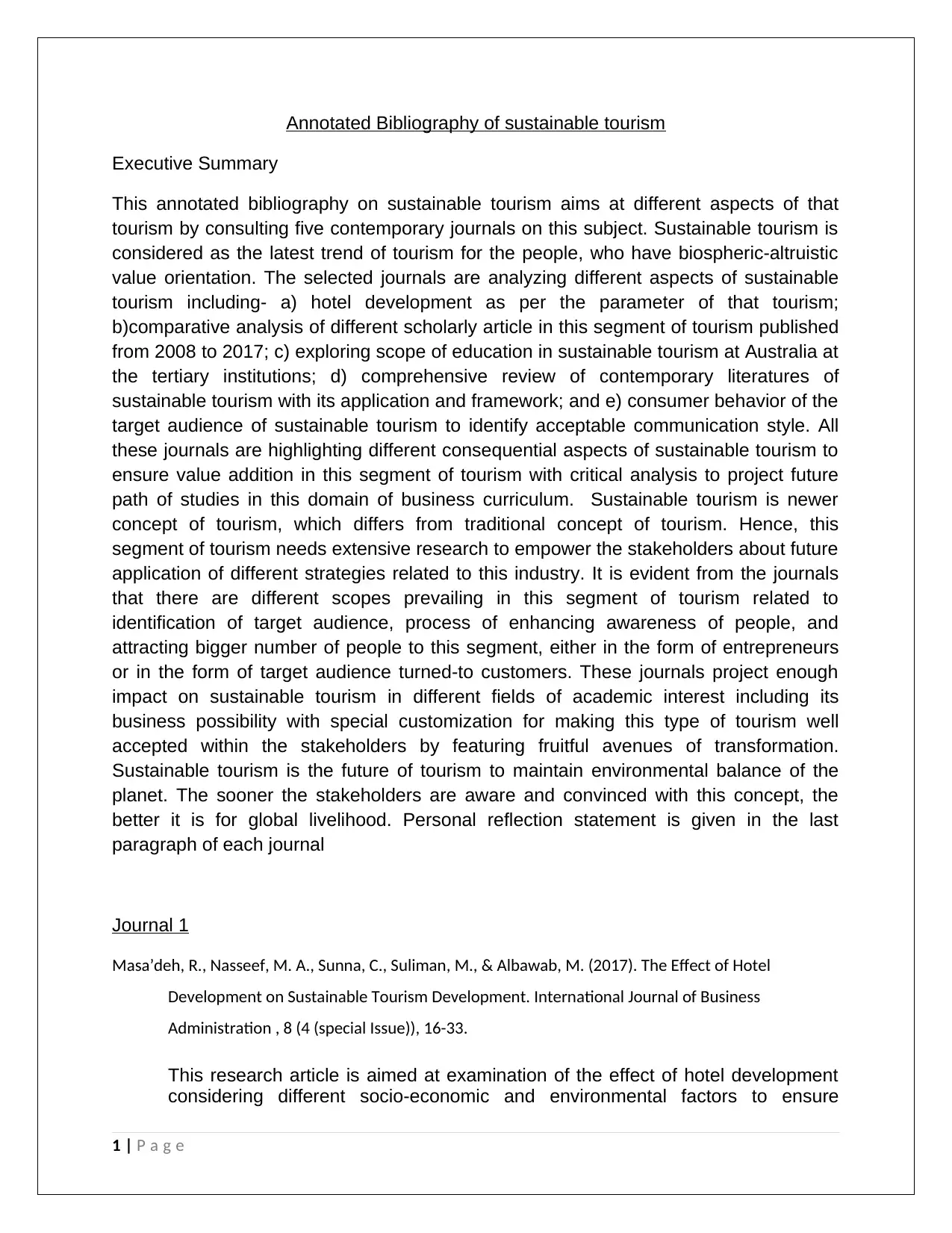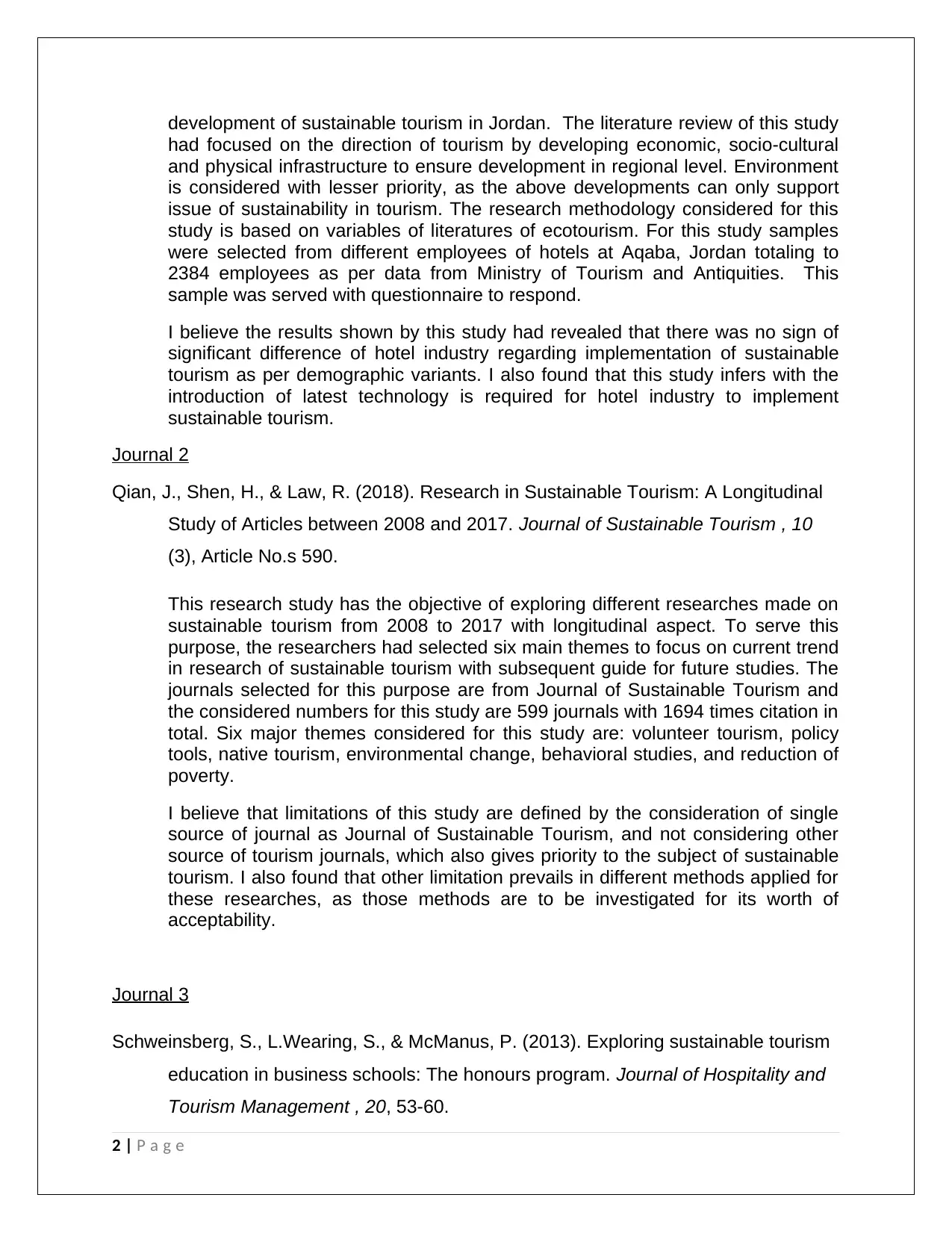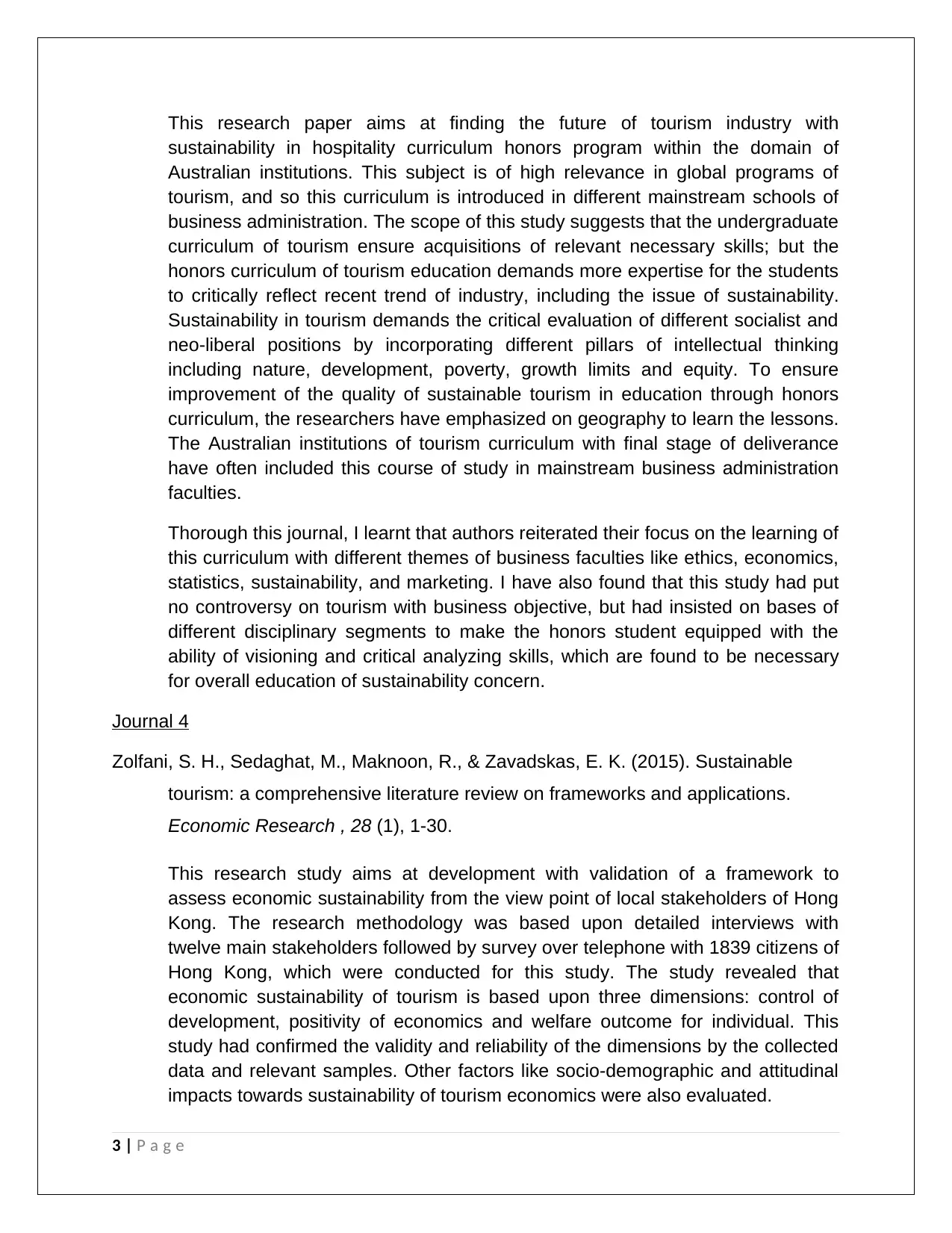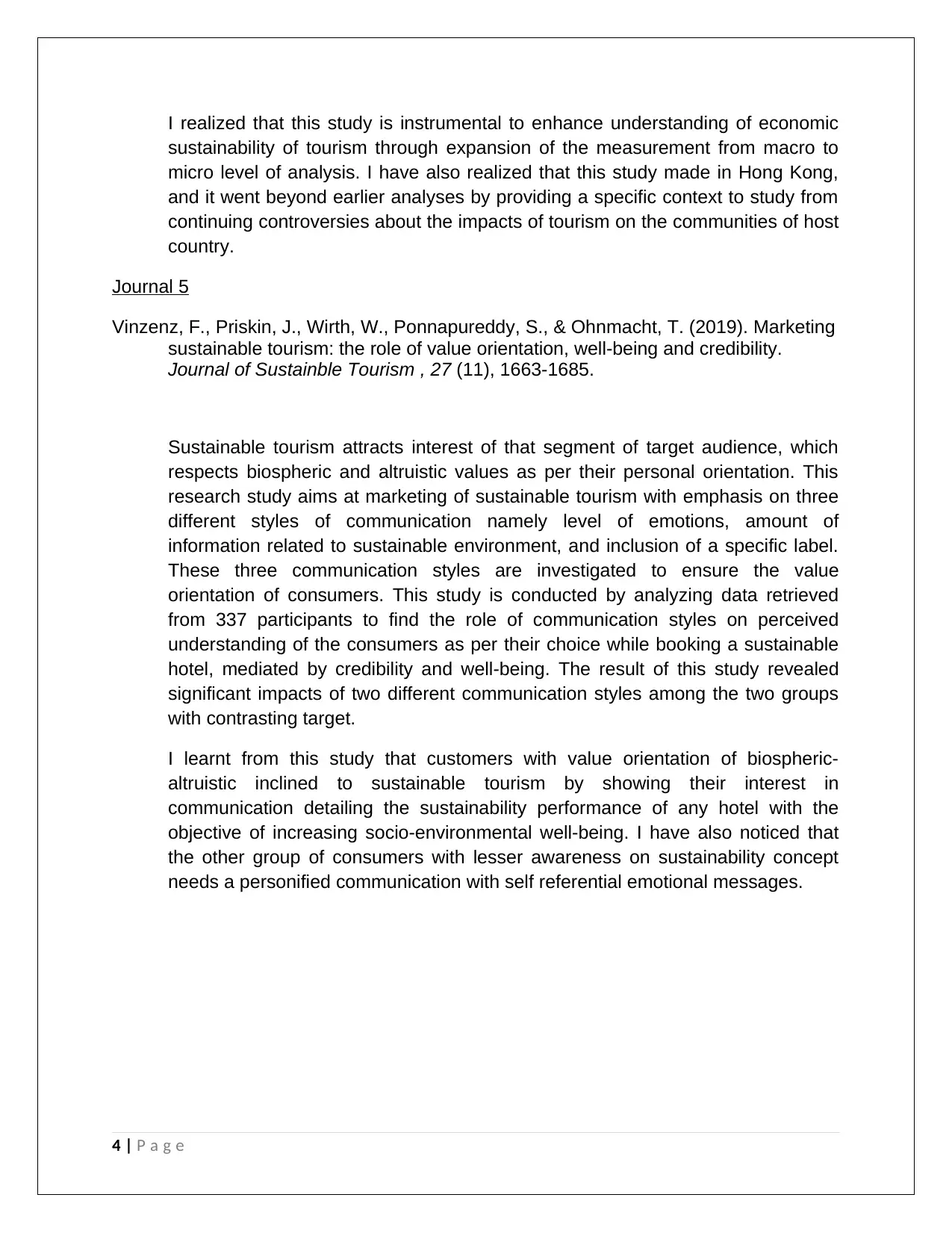Annotated Bibliography of Sustainable Tourism Development (HOS803)
VerifiedAdded on 2022/09/27
|5
|1623
|44
Annotated Bibliography
AI Summary
This annotated bibliography examines sustainable tourism through the lens of five contemporary journals. It explores various facets, including sustainable hotel development, a comparative analysis of scholarly articles from 2008-2017, the scope of education in sustainable tourism within Australian tertiary institutions, a comprehensive review of current literature with applications and frameworks, and consumer behavior analysis to identify effective communication strategies. The journals collectively highlight the importance of sustainable tourism, emphasizing the need for research to guide stakeholders. The bibliography covers topics such as identifying target audiences, raising awareness, and attracting entrepreneurs and customers. This research underscores sustainable tourism's role in environmental balance and its potential for academic and business applications. Each journal entry includes a personal reflection, providing critical analysis and insights into the future of sustainable tourism, which is crucial for global well-being.

Annotated Bibliography of sustainable tourism
Executive Summary
This annotated bibliography on sustainable tourism aims at different aspects of that
tourism by consulting five contemporary journals on this subject. Sustainable tourism is
considered as the latest trend of tourism for the people, who have biospheric-altruistic
value orientation. The selected journals are analyzing different aspects of sustainable
tourism including- a) hotel development as per the parameter of that tourism;
b)comparative analysis of different scholarly article in this segment of tourism published
from 2008 to 2017; c) exploring scope of education in sustainable tourism at Australia at
the tertiary institutions; d) comprehensive review of contemporary literatures of
sustainable tourism with its application and framework; and e) consumer behavior of the
target audience of sustainable tourism to identify acceptable communication style. All
these journals are highlighting different consequential aspects of sustainable tourism to
ensure value addition in this segment of tourism with critical analysis to project future
path of studies in this domain of business curriculum. Sustainable tourism is newer
concept of tourism, which differs from traditional concept of tourism. Hence, this
segment of tourism needs extensive research to empower the stakeholders about future
application of different strategies related to this industry. It is evident from the journals
that there are different scopes prevailing in this segment of tourism related to
identification of target audience, process of enhancing awareness of people, and
attracting bigger number of people to this segment, either in the form of entrepreneurs
or in the form of target audience turned-to customers. These journals project enough
impact on sustainable tourism in different fields of academic interest including its
business possibility with special customization for making this type of tourism well
accepted within the stakeholders by featuring fruitful avenues of transformation.
Sustainable tourism is the future of tourism to maintain environmental balance of the
planet. The sooner the stakeholders are aware and convinced with this concept, the
better it is for global livelihood. Personal reflection statement is given in the last
paragraph of each journal
Journal 1
Masa’deh, R., Nasseef, M. A., Sunna, C., Suliman, M., & Albawab, M. (2017). The Effect of Hotel
Development on Sustainable Tourism Development. International Journal of Business
Administration , 8 (4 (special Issue)), 16-33.
This research article is aimed at examination of the effect of hotel development
considering different socio-economic and environmental factors to ensure
1 | P a g e
Executive Summary
This annotated bibliography on sustainable tourism aims at different aspects of that
tourism by consulting five contemporary journals on this subject. Sustainable tourism is
considered as the latest trend of tourism for the people, who have biospheric-altruistic
value orientation. The selected journals are analyzing different aspects of sustainable
tourism including- a) hotel development as per the parameter of that tourism;
b)comparative analysis of different scholarly article in this segment of tourism published
from 2008 to 2017; c) exploring scope of education in sustainable tourism at Australia at
the tertiary institutions; d) comprehensive review of contemporary literatures of
sustainable tourism with its application and framework; and e) consumer behavior of the
target audience of sustainable tourism to identify acceptable communication style. All
these journals are highlighting different consequential aspects of sustainable tourism to
ensure value addition in this segment of tourism with critical analysis to project future
path of studies in this domain of business curriculum. Sustainable tourism is newer
concept of tourism, which differs from traditional concept of tourism. Hence, this
segment of tourism needs extensive research to empower the stakeholders about future
application of different strategies related to this industry. It is evident from the journals
that there are different scopes prevailing in this segment of tourism related to
identification of target audience, process of enhancing awareness of people, and
attracting bigger number of people to this segment, either in the form of entrepreneurs
or in the form of target audience turned-to customers. These journals project enough
impact on sustainable tourism in different fields of academic interest including its
business possibility with special customization for making this type of tourism well
accepted within the stakeholders by featuring fruitful avenues of transformation.
Sustainable tourism is the future of tourism to maintain environmental balance of the
planet. The sooner the stakeholders are aware and convinced with this concept, the
better it is for global livelihood. Personal reflection statement is given in the last
paragraph of each journal
Journal 1
Masa’deh, R., Nasseef, M. A., Sunna, C., Suliman, M., & Albawab, M. (2017). The Effect of Hotel
Development on Sustainable Tourism Development. International Journal of Business
Administration , 8 (4 (special Issue)), 16-33.
This research article is aimed at examination of the effect of hotel development
considering different socio-economic and environmental factors to ensure
1 | P a g e
Paraphrase This Document
Need a fresh take? Get an instant paraphrase of this document with our AI Paraphraser

development of sustainable tourism in Jordan. The literature review of this study
had focused on the direction of tourism by developing economic, socio-cultural
and physical infrastructure to ensure development in regional level. Environment
is considered with lesser priority, as the above developments can only support
issue of sustainability in tourism. The research methodology considered for this
study is based on variables of literatures of ecotourism. For this study samples
were selected from different employees of hotels at Aqaba, Jordan totaling to
2384 employees as per data from Ministry of Tourism and Antiquities. This
sample was served with questionnaire to respond.
I believe the results shown by this study had revealed that there was no sign of
significant difference of hotel industry regarding implementation of sustainable
tourism as per demographic variants. I also found that this study infers with the
introduction of latest technology is required for hotel industry to implement
sustainable tourism.
Journal 2
Qian, J., Shen, H., & Law, R. (2018). Research in Sustainable Tourism: A Longitudinal
Study of Articles between 2008 and 2017. Journal of Sustainable Tourism , 10
(3), Article No.s 590.
This research study has the objective of exploring different researches made on
sustainable tourism from 2008 to 2017 with longitudinal aspect. To serve this
purpose, the researchers had selected six main themes to focus on current trend
in research of sustainable tourism with subsequent guide for future studies. The
journals selected for this purpose are from Journal of Sustainable Tourism and
the considered numbers for this study are 599 journals with 1694 times citation in
total. Six major themes considered for this study are: volunteer tourism, policy
tools, native tourism, environmental change, behavioral studies, and reduction of
poverty.
I believe that limitations of this study are defined by the consideration of single
source of journal as Journal of Sustainable Tourism, and not considering other
source of tourism journals, which also gives priority to the subject of sustainable
tourism. I also found that other limitation prevails in different methods applied for
these researches, as those methods are to be investigated for its worth of
acceptability.
Journal 3
Schweinsberg, S., L.Wearing, S., & McManus, P. (2013). Exploring sustainable tourism
education in business schools: The honours program. Journal of Hospitality and
Tourism Management , 20, 53-60.
2 | P a g e
had focused on the direction of tourism by developing economic, socio-cultural
and physical infrastructure to ensure development in regional level. Environment
is considered with lesser priority, as the above developments can only support
issue of sustainability in tourism. The research methodology considered for this
study is based on variables of literatures of ecotourism. For this study samples
were selected from different employees of hotels at Aqaba, Jordan totaling to
2384 employees as per data from Ministry of Tourism and Antiquities. This
sample was served with questionnaire to respond.
I believe the results shown by this study had revealed that there was no sign of
significant difference of hotel industry regarding implementation of sustainable
tourism as per demographic variants. I also found that this study infers with the
introduction of latest technology is required for hotel industry to implement
sustainable tourism.
Journal 2
Qian, J., Shen, H., & Law, R. (2018). Research in Sustainable Tourism: A Longitudinal
Study of Articles between 2008 and 2017. Journal of Sustainable Tourism , 10
(3), Article No.s 590.
This research study has the objective of exploring different researches made on
sustainable tourism from 2008 to 2017 with longitudinal aspect. To serve this
purpose, the researchers had selected six main themes to focus on current trend
in research of sustainable tourism with subsequent guide for future studies. The
journals selected for this purpose are from Journal of Sustainable Tourism and
the considered numbers for this study are 599 journals with 1694 times citation in
total. Six major themes considered for this study are: volunteer tourism, policy
tools, native tourism, environmental change, behavioral studies, and reduction of
poverty.
I believe that limitations of this study are defined by the consideration of single
source of journal as Journal of Sustainable Tourism, and not considering other
source of tourism journals, which also gives priority to the subject of sustainable
tourism. I also found that other limitation prevails in different methods applied for
these researches, as those methods are to be investigated for its worth of
acceptability.
Journal 3
Schweinsberg, S., L.Wearing, S., & McManus, P. (2013). Exploring sustainable tourism
education in business schools: The honours program. Journal of Hospitality and
Tourism Management , 20, 53-60.
2 | P a g e

This research paper aims at finding the future of tourism industry with
sustainability in hospitality curriculum honors program within the domain of
Australian institutions. This subject is of high relevance in global programs of
tourism, and so this curriculum is introduced in different mainstream schools of
business administration. The scope of this study suggests that the undergraduate
curriculum of tourism ensure acquisitions of relevant necessary skills; but the
honors curriculum of tourism education demands more expertise for the students
to critically reflect recent trend of industry, including the issue of sustainability.
Sustainability in tourism demands the critical evaluation of different socialist and
neo-liberal positions by incorporating different pillars of intellectual thinking
including nature, development, poverty, growth limits and equity. To ensure
improvement of the quality of sustainable tourism in education through honors
curriculum, the researchers have emphasized on geography to learn the lessons.
The Australian institutions of tourism curriculum with final stage of deliverance
have often included this course of study in mainstream business administration
faculties.
Thorough this journal, I learnt that authors reiterated their focus on the learning of
this curriculum with different themes of business faculties like ethics, economics,
statistics, sustainability, and marketing. I have also found that this study had put
no controversy on tourism with business objective, but had insisted on bases of
different disciplinary segments to make the honors student equipped with the
ability of visioning and critical analyzing skills, which are found to be necessary
for overall education of sustainability concern.
Journal 4
Zolfani, S. H., Sedaghat, M., Maknoon, R., & Zavadskas, E. K. (2015). Sustainable
tourism: a comprehensive literature review on frameworks and applications.
Economic Research , 28 (1), 1-30.
This research study aims at development with validation of a framework to
assess economic sustainability from the view point of local stakeholders of Hong
Kong. The research methodology was based upon detailed interviews with
twelve main stakeholders followed by survey over telephone with 1839 citizens of
Hong Kong, which were conducted for this study. The study revealed that
economic sustainability of tourism is based upon three dimensions: control of
development, positivity of economics and welfare outcome for individual. This
study had confirmed the validity and reliability of the dimensions by the collected
data and relevant samples. Other factors like socio-demographic and attitudinal
impacts towards sustainability of tourism economics were also evaluated.
3 | P a g e
sustainability in hospitality curriculum honors program within the domain of
Australian institutions. This subject is of high relevance in global programs of
tourism, and so this curriculum is introduced in different mainstream schools of
business administration. The scope of this study suggests that the undergraduate
curriculum of tourism ensure acquisitions of relevant necessary skills; but the
honors curriculum of tourism education demands more expertise for the students
to critically reflect recent trend of industry, including the issue of sustainability.
Sustainability in tourism demands the critical evaluation of different socialist and
neo-liberal positions by incorporating different pillars of intellectual thinking
including nature, development, poverty, growth limits and equity. To ensure
improvement of the quality of sustainable tourism in education through honors
curriculum, the researchers have emphasized on geography to learn the lessons.
The Australian institutions of tourism curriculum with final stage of deliverance
have often included this course of study in mainstream business administration
faculties.
Thorough this journal, I learnt that authors reiterated their focus on the learning of
this curriculum with different themes of business faculties like ethics, economics,
statistics, sustainability, and marketing. I have also found that this study had put
no controversy on tourism with business objective, but had insisted on bases of
different disciplinary segments to make the honors student equipped with the
ability of visioning and critical analyzing skills, which are found to be necessary
for overall education of sustainability concern.
Journal 4
Zolfani, S. H., Sedaghat, M., Maknoon, R., & Zavadskas, E. K. (2015). Sustainable
tourism: a comprehensive literature review on frameworks and applications.
Economic Research , 28 (1), 1-30.
This research study aims at development with validation of a framework to
assess economic sustainability from the view point of local stakeholders of Hong
Kong. The research methodology was based upon detailed interviews with
twelve main stakeholders followed by survey over telephone with 1839 citizens of
Hong Kong, which were conducted for this study. The study revealed that
economic sustainability of tourism is based upon three dimensions: control of
development, positivity of economics and welfare outcome for individual. This
study had confirmed the validity and reliability of the dimensions by the collected
data and relevant samples. Other factors like socio-demographic and attitudinal
impacts towards sustainability of tourism economics were also evaluated.
3 | P a g e
⊘ This is a preview!⊘
Do you want full access?
Subscribe today to unlock all pages.

Trusted by 1+ million students worldwide

I realized that this study is instrumental to enhance understanding of economic
sustainability of tourism through expansion of the measurement from macro to
micro level of analysis. I have also realized that this study made in Hong Kong,
and it went beyond earlier analyses by providing a specific context to study from
continuing controversies about the impacts of tourism on the communities of host
country.
Journal 5
Vinzenz, F., Priskin, J., Wirth, W., Ponnapureddy, S., & Ohnmacht, T. (2019). Marketing
sustainable tourism: the role of value orientation, well-being and credibility.
Journal of Sustainble Tourism , 27 (11), 1663-1685.
Sustainable tourism attracts interest of that segment of target audience, which
respects biospheric and altruistic values as per their personal orientation. This
research study aims at marketing of sustainable tourism with emphasis on three
different styles of communication namely level of emotions, amount of
information related to sustainable environment, and inclusion of a specific label.
These three communication styles are investigated to ensure the value
orientation of consumers. This study is conducted by analyzing data retrieved
from 337 participants to find the role of communication styles on perceived
understanding of the consumers as per their choice while booking a sustainable
hotel, mediated by credibility and well-being. The result of this study revealed
significant impacts of two different communication styles among the two groups
with contrasting target.
I learnt from this study that customers with value orientation of biospheric-
altruistic inclined to sustainable tourism by showing their interest in
communication detailing the sustainability performance of any hotel with the
objective of increasing socio-environmental well-being. I have also noticed that
the other group of consumers with lesser awareness on sustainability concept
needs a personified communication with self referential emotional messages.
4 | P a g e
sustainability of tourism through expansion of the measurement from macro to
micro level of analysis. I have also realized that this study made in Hong Kong,
and it went beyond earlier analyses by providing a specific context to study from
continuing controversies about the impacts of tourism on the communities of host
country.
Journal 5
Vinzenz, F., Priskin, J., Wirth, W., Ponnapureddy, S., & Ohnmacht, T. (2019). Marketing
sustainable tourism: the role of value orientation, well-being and credibility.
Journal of Sustainble Tourism , 27 (11), 1663-1685.
Sustainable tourism attracts interest of that segment of target audience, which
respects biospheric and altruistic values as per their personal orientation. This
research study aims at marketing of sustainable tourism with emphasis on three
different styles of communication namely level of emotions, amount of
information related to sustainable environment, and inclusion of a specific label.
These three communication styles are investigated to ensure the value
orientation of consumers. This study is conducted by analyzing data retrieved
from 337 participants to find the role of communication styles on perceived
understanding of the consumers as per their choice while booking a sustainable
hotel, mediated by credibility and well-being. The result of this study revealed
significant impacts of two different communication styles among the two groups
with contrasting target.
I learnt from this study that customers with value orientation of biospheric-
altruistic inclined to sustainable tourism by showing their interest in
communication detailing the sustainability performance of any hotel with the
objective of increasing socio-environmental well-being. I have also noticed that
the other group of consumers with lesser awareness on sustainability concept
needs a personified communication with self referential emotional messages.
4 | P a g e
Paraphrase This Document
Need a fresh take? Get an instant paraphrase of this document with our AI Paraphraser

5 | P a g e
1 out of 5
Related Documents
Your All-in-One AI-Powered Toolkit for Academic Success.
+13062052269
info@desklib.com
Available 24*7 on WhatsApp / Email
![[object Object]](/_next/static/media/star-bottom.7253800d.svg)
Unlock your academic potential
Copyright © 2020–2026 A2Z Services. All Rights Reserved. Developed and managed by ZUCOL.




